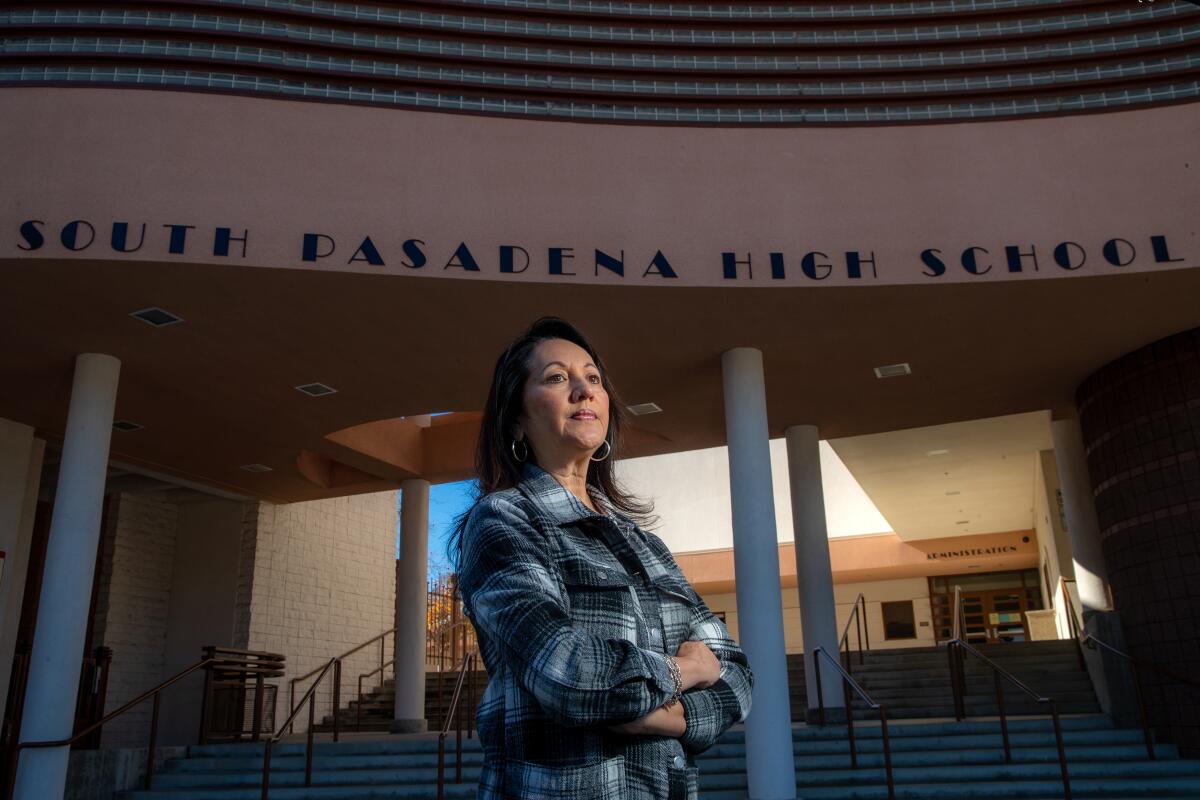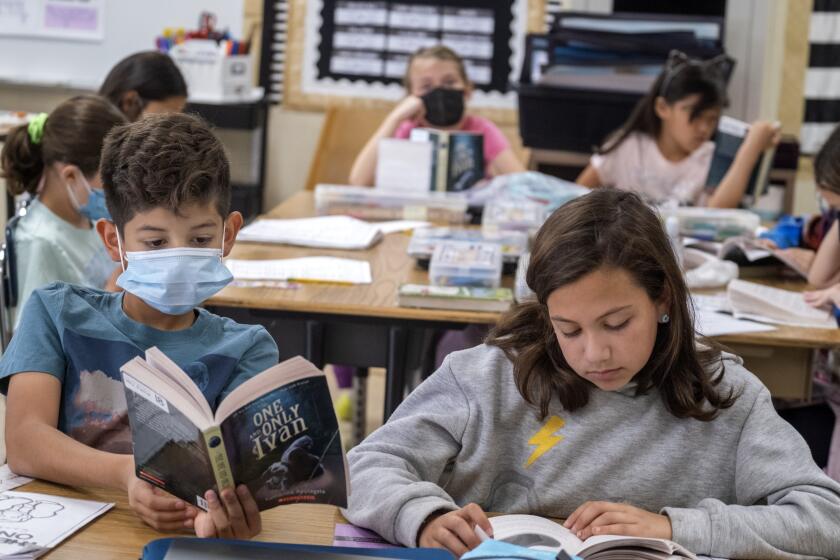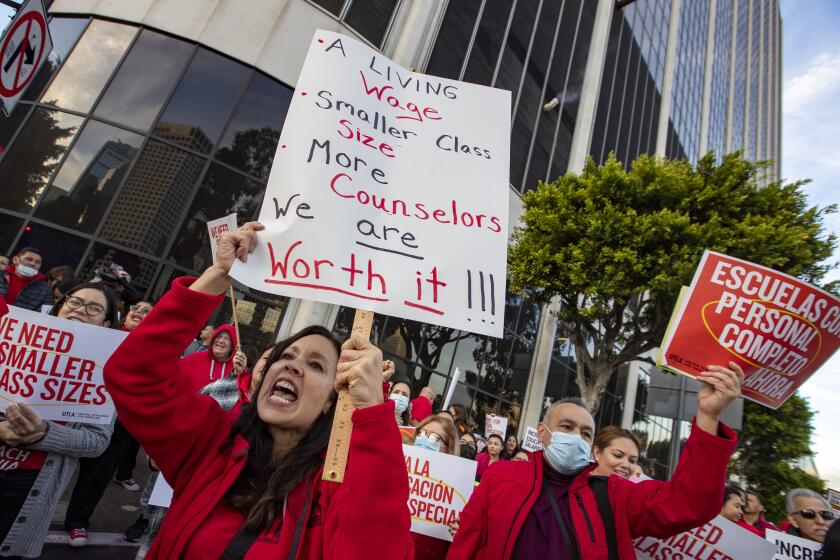California public schools allow ‘pay to learn’ summer courses at high prices. Is it legal?

- Share via
Two years ago, when Anne Bagasao’s daughter Grace was a sophomore at South Pasadena High School, she reluctantly approached her mother with a request, knowing money was tight. Many of her peers planned to get ahead by taking U.S. history, a graduation requirement, over the summer through a class offered by an educational foundation that supports the district. She wanted to do the same. The cost was more than $500.
Bagasao, a single mother, didn’t have the money. But she was determined that her daughter have the same educational opportunities as her friends. She applied for tuition assistance, which offered partial help and took on a payment plan to cover the balance.
“It was humiliating from start to finish,” Bagasao said.
California’s Constitution ensures students the right to a free public school education and public schools are barred from charging fees for educational activities. A long-standing opinion from the attorney general says school districts can’t ask students to pay for summer school.
But across California, private educational foundations, which exist to support public school districts, rent campus space and run tuition-based summer school — charging as much as $720 for a class. Their programs fill a void for school systems that can’t afford to offer free summer courses.
On Wednesday, attorneys with the pro bono law firm Public Counsel and others filed suit against the state, Supt. of Public Instruction Tony Thurmond and the Department of Education saying the fees are illegal. By allowing these fee-supported programs to thrive without state oversight, California fails its responsibility to ensure access to a free public education, the suit argues.
“For all practical purposes, these education foundations function as fronts for school districts that, among other things, enable them to collect tuition from students for summer school offerings,” the complaint filed in L.A. County Superior Court says.
Revised version of signature L.A. Unified plan to address learning loss through extra school days attracts limited participation, about 11% of students sign up.
The programs are billed as a way to get ahead, especially for high schoolers. Students can receive credit for taking summer classes needed to graduate or meet college entrance requirements, such as algebra, geometry and U.S. history. This frees up valuable time during the school year to take advanced classes to strengthen their transcripts or even pursue extra-curricular activities.
Each program is unique, but the foundations frequently work closely with districts — using public school campuses and approved curriculum while hiring district teachers and administrators to run the summer school. Often, when revenue from tuition exceeds the cost of operations, money is returned to the districts as a donation.
Families and advocates for the summer schools say the programs provide valuable academic opportunities and enrichment for students despite a lack of state funding for such programs. They also note that the foundations are separate legal entities from the districts and have the right to rent campus space in accordance with district policies.
Such programs have flourished for years across the state — particularly in districts in affluent communities where many families can more afford to foot the bill.
In Arcadia last summer, students could take Algebra I or geometry for $690 or chemistry for $720 on the Arcadia High School campus through summer school offered by the Arcadia Educational Foundation, whose “purpose is to raise funds for the Arcadia Unified School District,” according to its website.
In Manhattan Beach, the MBX Foundation, which supports Manhattan Beach Unified School District, offered a variety of 10-credit classes for $650. Net proceeds, the foundation noted in a presentation to parents “are granted to MBUSD.”
In response to questions about the fees, state officials said anyone can raise complaints about suspected illegal fees with a local public school principal and that districts should weigh several factors to determine whether a summer school is allowed.
In September, in response to questions raised by Public Counsel and other lawyers, the state Education Department sent districts a letter offering guidance. In part, districts should consider “the organizational structure of the third party, such as whether it is a separate legal entity and the degree of independence” from the district and “the relationship between the third party” and the district.
Mark Rosenbaum, an attorney for Public Counsel, said putting the onus on parents to raise complaints in individual cases allows the state to abdicate its responsibilities.
“The state’s deliberate indifference to pay to learn schemes on its own campuses handsomely rewards districts that flaunt the law and families with resources to give their children a competitive advantage our Constitution has proscribed,” the suit says.
In Arcadia, the Arcadia Educational Foundation’s summer school has offered an array of classes for years.
In elementary grades, students are offered fun classes such as “Wild World of Animals,” “Young Einsteins” and “Medieval Mayhem.”
The high school program allows students to take several core courses — such as algebra, geometry, biology and chemistry on the Arcadia High School campus. Fees range from $175 for a no-credit college essay workshop to $720 for some 10-credit classes.
The course catalog notes that several summer courses, like biology, are not recommended for Limited English Proficient students.
2022 California test scores show 84% of Black students and 79% of Latino and low-income students did not meet state math standards.
Last year, Arcadia High’s principal and assistant principal, who served as the summer school principal, sent a letter noting that the program offers students the chance to improve their GPAs and accelerate progress toward graduation and college entrance requirements. The foundation leases the high school facilities, equipment and other materials from the district, the letter said.
Ryan Foran, spokesman for Arcadia Unified, said students who need credit recovery courses can take them for free during the summer through the district. And, he said, students have the option to take summer classes for credit through a number of programs in the community. The foundation and its summer school are totally separate from the district, he said.
“They rent our facilities, just like any other organization can. For example, AYSO, Boys Scouts, Girls Scouts, Little League, the City of Arcadia, etc.,” he said.
Foran also noted that California’s school funding formulas — which provide greater funding to schools with large concentrations of low-income students, English learners and foster youth — create a situation in which districts like Arcadia, with fewer such students, “are absolutely forced to rely on outside funding sources, such as an educational foundation.”
“If it’s not AEF doing summer school, if it’s not these foundations doing it, somebody else will come in and do it because there’s a need and a want for it,” Foran said. “If the state funded us for summer school we would probably just do it. Do they fund us for summer school? No.”
In South Pasadena, summer school offered by the South Pasadena Educational Foundation has become a tradition among many families.
Children who have gone through the program have fond memories of summers spent learning to play an instrument, learning to code or studying filmmaking. Others take a more academic-minded approach with courses like “Getting Ready for Kindergarten,” or “Jump Start to Math.”
Educators want a 20% raise but says they’re also committed to demands that represent the union’s social values, such as solar panels and electric buses.
At the high school level, students can take classes that are required for graduation or college admissions. Each day of classes is “roughly equivalent to one week of instruction during the regular school year,” the catalog says. “Summer School classes require a serious commitment.”
Emilia Aldana, president of the foundation’s executive committee and the mother of three students in the district, said her children have thrived in classes taken during the foundation’s summer school. Some of the classes were for fun or enrichment — like oceanography and paper plane making. Others allowed them to strengthen their academics.
“We’re grateful for the experience we’ve had here in South Pasadena. For the way they’ve grown and their trajectories,” Aldana said.
She also noted that while the costs can be significant, the foundation offers help with tuition.
“It’s not exclusive to anyone. And there are resources available to people if they need them,” she said.
Stacey Petersen, executive director of the foundation, said in an email that the program helps fill in a gap that exists because of a lack of state funding for summer school.
“South Pasadena Unified School District does not receive ongoing annual state funding to offer a free, comprehensive summer school program for credit recovery or enrichment courses and electives, nor is it required by California Education Code,” Petersen said. “SPEF is a separate entity allowed to provide educational programs for a fee.”
Credit recovery courses are offered at no cost to South Pasadena students, she added.
Grace Dennis, whose mother Anne Bagasao struggled to pay for her U.S. history summer class, said when she had a hard time keeping up with the course, it was extremely stressful.
“Not only was I worried about being behind in a class but I was also freaking out because if I were to fail, we had spent so much money,” said Grace, who passed the course. “The pressure of the money made that experience so much worse.”
Bagasao recalls her daughter working for hours at a time to catch up in the class, as they both worried the money would go to waste.
“It was awful. I hated seeing my daughter going through this,” she said. “It’s very hard not to be affluent in South Pasadena.”
More to Read
Sign up for Essential California
The most important California stories and recommendations in your inbox every morning.
You may occasionally receive promotional content from the Los Angeles Times.

















